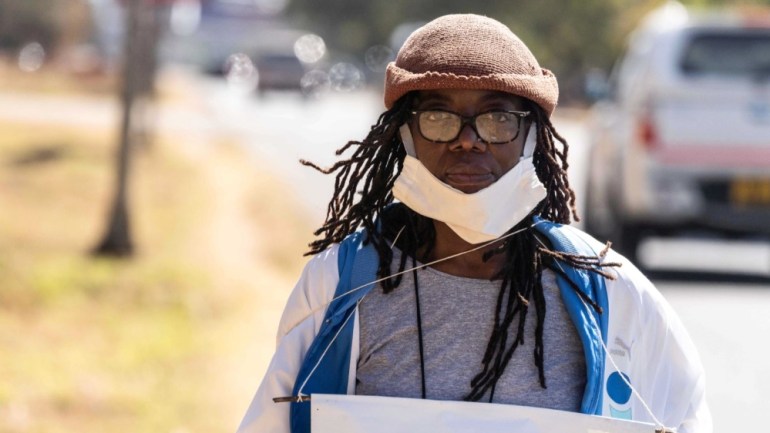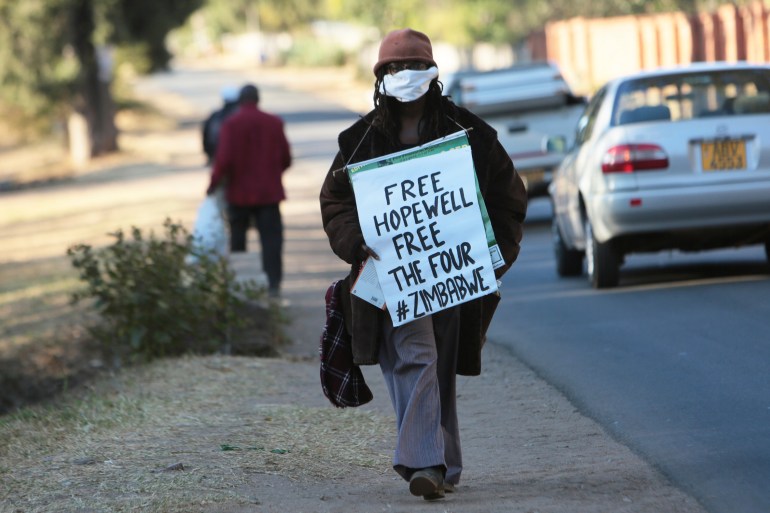

TSITSI Dangarembga’s debut novel, Nervous Conditions, released in 1988, has been described as one of the 100 books that “shaped the world”. This year, the latest book by the Zimbabwean novelist, filmmaker and activist, This Mournable Body, has been shortlisted for the prestigious Booker Prize.
It is the third in a trilogy, following on from Nervous Conditions and The Book of Not (2006). The three books examine the sickness of the body politic in Zimbabwe through the eyes of Tambudzai Sigauke (Tambu), a young girl in the first novel and a grown woman in the third.
Born in 1959, Dangarembga was the first Black Zimbabwean woman to publish a novel in English.
On July 31, she was arrested for participating in an anti-corruption protest in the Zimbabwean capital Harare and charged with inciting public violence. She was released on bail the following day. Her next court appearance is scheduled for November 24.
She spoke to Al Jazeera:
Al Jazeera: To what extent was the trilogy intended to tell the history of Zimbabwe through the eyes of their central character, Tambu?
Dangarembga: The books are the chronicle of the life of an ordinary woman living in Rhodesia [as Zimbabwe was formerly known] and Zimbabwe. To the extent that the situation and changes in the nation impact on her life, the books reflect the history of the country.
My intention was to put characters in a world that Zimbabweans recognise. It was inevitable that there would be there this interlinking between the characters in the novel and Zimbabwe as a country.
The political trajectory in Zimbabwe has been so negative. If you have a negative trajectory the space for people to operate shrinks and everybody is pushed into this very narrow tunnel. If the trajectory had been positive there would have been so many possibilities for a character to develop that I could have had many different stories but because everything has shrunk and everyone, one way or the other, is fighting to survive, it meant that was the story that could be told.

I think that people need to choose why they write. I think that politics is meant to serve the person, the individual, human society. If fiction only serves politics then, for me, it would not be doing service to the general society, to the human condition. To me, it really is very important to say something meaningful to people about their lives and how we can negotiate life. But I do not think that is the case for everybody. Everybody is engaged with their environment in some way, including writers. So that is all that writers have to give back. Even if you call it imagination it’s still coming from something that has impinged on you in some way.
It was not my intention to tell the story of Zimbabwe through the eyes of this girl. It was my intention to tell the story of a woman making her way in a particular environment and that particular environment was Zimbabwe and we can see that her options shrink as she goes along because of the nature of society. Zimbabwe is not offering opportunities. Opportunities are shrinking. And that is why it developed this close parallel to Zimbabwe’s history at the end of the novel. If Zimbabwe had been like Germany, for example, you could have had so many different stories that do not really have to do with the politics of the day because your life is not individually every day determined by repression and poverty. That is the tragedy of Zimbabwean life: that life, the whole greatness of human experience, is really curtailed because of the political microcosm.
In repressive societies people are pressed, literally pressed, into narrowness and narrow spaces. As the society releases that pressure, then you get broader concerns which can also be depicted. We have been compressed into this narrow range of being.
Al Jazeera: And do you think the curtailment goes beyond the physical and extends to intellectual curtailment?
Dangarembga: Absolutely. You just do not have the mental space to be dealing with things because you get up in the morning and you are worried about water. Will I have water? You’re living in the city and you queue up at a borehole that the council has drilled. And this happens even in an affluent neighbourhood. You simply cannot get away from how the situation is impacting on your life.
Our politicians do not understand that their role is not to make life impossible for people. It is meant to be to make life possible. When life is possible for individuals then the nation produces what needs to be produced and we can go on. But the more repressive a state becomes the less we can affirm ourselves in this space. And so the stories shrink.
Al Jazeera: You have in the past lamented the fact that Black women and children do not feature strongly enough in fiction. Have you seen any changes in that regard?
Dangarembga: There has been a great change in this respect. The world of publishing has opened up to a Black narrative. However, this literature has to be produced. Not all communities of Black people are resourced to produce literature, so there is still a skew in the characters featured and the kinds of stories that are accepted for publication. While the situation has improved vastly, there is still work to be done.
Which writers do I admire? There is Novuyo Tshuma, a Zimbabwean. The South African writer who wrote Young Blood, Sifiso Mzobe and Zakes Mda. Thando Mgqolozana is brilliant. There is much good writing coming out of the southern part of the African continent. Going further afield, there are West African writers that are brilliant.
The protagonist in Tshuma’s House of Stone is completely concerned with his identity because he was a child born during the Matabeleland genocide [when more than 20,000 people were massacred by Robert Mugabe’s Fifth Brigade in 1983] and that completely informs his trajectory in the book. If you look at Young Blood, it’s about a young person who gets involved in drugs in South Africa and then has to pull himself out of it. Again, that is the reality on the ground which has political foundations in South Africa. And the protagonist in Zakes Mda’s book, Ways of Dying, faces exactly the same thing.
Al Jazeera: The 2020 Booker Prize shortlist has been praised for being the most diverse to date. But you are the only shortlisted candidate not based in the US. What is your understanding of diversity?
Dangarembga: Three of the shortlisted candidates have non-US backgrounds: one Scottish, one Southeast Asian and one Ethiopian. Coming from a hegemonic literary tradition, we obviously need diversity. We obviously need to talk about diversity in the sense of disrupting hegemonic traditions. Hegemony establishes itself through gatekeeping and deciding who can be included and who cannot. We need to talk about those who are excluded and open up. It is a useful debate at the theoretical and policy level.
How it translates into practice is different. That is when it is instructive to ask: why is everybody but me in the US? It must tell us something about what the US does that enables narratives to be told. How is these peoples’ talent being nurtured in the US in ways that it is not elsewhere? Do they have jobs or grants there? We do not like to talk about the “American dream”. But is there something there? Why did those people not stay where they were? And why is it that the ones who have stayed are not performing at the same level? Do they now, living in the US, have the opportunity and the platform to fulfil their potential?
In general, I prefer to engage with the notion of inclusion. All communities of people need to be included in positive social processes.
Al Jazeera: The BBC has described Nervous Conditions as one of the 100 books that “shaped the world”. Do you believe the book has made a difference to its readers and, if so, how? What kind of impact did you hope your books would have?
Dangarembga: I think Nervous Conditions gave and continues to give many young Zimbabwean and other African women an insight into the environment they find themselves in, which can be very challenging for them. I was pleasantly surprised to find that those insights were of interest to other readers as well, who learnt more about the challenges young women in particular and other women of colour face.

Al Jazeera: You were arrested during an anti-corruption protest in Harare at the end of July and are currently out on bail. What is the current state of the case?
Dangarembga: On my fourth visit to court on October 7, a hearing finally took place. One of the requests my lawyers made at the hearing was for a trial date. The case was postponed. I return to court on November 24, to hear the ruling on that and the other requests that were made.
I do not know what sentence can be expected if I am convicted by the court. I have not asked, nor have my lawyers told me. My arrest and the arrests of others who protested on July 31, or even in the days leading up to July 31 indicate that the right to peaceful protest is seriously eroded in Zimbabwe. Zimbabwean citizens are expected to keep silent and docilely accept whatever the authorities decide to do, or face arrest for peacefully expressed differences of opinion.
Al Jazeera: You were the first Zimbabwean woman to publish an English novel. What kept women back from writing in Zimbabwe? What limitations do women writers still encounter?
Dangarembga: I think it has to do with Zimbabwean nature. Zimbabweans generally do things to conform and to be part of the flow. And to stand out is not seen as anything good. And even more so for women. Women who are sufficiently educated to write in English, if that was the ambition, would also want to conform, having put themselves out on a limb so far anyway. I do not think they would want to go further. We had women writing in other languages in Zimbabwe before then and those languages did not require that level of formal education. I had English up to O level. I did not have a high level of education. I think the kind of person who would say: “I don’t care, I’m going to write my story”, would not be the kind of person who excelled in the education system because it was a system that was geared to produce certain products and not those products who would go out on a limb. This applied even more to women. It was only after I decided that mainstream occupations were not for me that I started writing seriously.
In Zimbabwe, we are faced with multiple oppressions. We go back to traditional society and conservative patriarchal society in which women are not really expected to have a voice so that again is working upon women to silence them. And then you come into this postcolonial state where the material circumstances are such that women are heavily burdened in just managing that situation. A small example: you need to fill your child’s lunchbox to go to school. How do you do this? You go to the shop, there is nothing that you can afford. You have got to walk goodness knows where to find somebody who is maybe selling some sweet potatoes. This is what women will do. If you have to wash the children or do the laundry or if you are looking after an elderly relative because there is no provision for them, this works functionally to make sure that women’s energy does not manifest in expression but really in drudgery, dealing with drudgery.
Al Jazeera: What influence has your own mother had on your life? In Nervous Conditions you wrote of the “bitter circumstances” of motherhood. What did you mean by this?
Dangarembga: I meant that it is very difficult for a mother to watch her children grow up with no hope, no prospects, no opportunities, in a situation where she can barely feed them and keep them healthy. My mother showed me that it is quite normal for a woman to be intellectually competent. My mother was the person who made me realise that it is possible for a woman to do something in life.
Al Jazeera: When did you know you wanted to be a writer?
Dangarembga: I find that writing wanted me, rather than the other way round. I have always had the urge to tell stories, but did not think that I would write for a living. What I actually wanted in terms of choosing a creative career was to be a filmmaker. Having said that, I wanted to write speculative fiction from when I was eight years old. Even then, I did not think about being “a writer”. I also find the idea of wanting to engage in writing different from the idea of wanting to be a writer. I thought I would write as I did other things. Then at some point, I found that writing consumed me and I gave in to that. I would still like to make my films, which also begin with writing.
Al Jazeera: Your writing has explored the theme of betrayal and, in particular, the betrayal of convictions. Do you feel betrayed by current Zimbabwean President Emmerson Mnangagwa who came to power in 2019 and was widely expected to bring change from the repressive rule of Robert Mugabe?
Dangarembga: The betrayal, in my opinion, began before independence. Violent intimidation has been the strategy of the ruling party (ZANU-PF) to keep the population tame, in order to achieve their power objectives since before independence. There were so many conflicts in the armed struggle going right back to pre-independence and the path was already laid down, the path of anti-intellectualism, where we do not think things through in light of the context of where we are and in light of all the knowledge that is available in the 20th century. We were very dogmatic. We are African and our tradition is what we are following. It is just ridiculous because you are not operating in the 16th century, so what are you harking back to? So that was definitely laid down in the armed struggle.

We believed that the leaders were definitely engaging with the present reality. We believed that the leaders were constructing the best path for the nation, but they were just constructing a state that they could occupy to do as they please. They were constructing the form of the state as a niche for themselves to go in and do whatever they wanted to do. So this was a betrayal but obviously, this does not happen in five years or 10 years. Constructing a state that is so oppressive is something that takes a long trajectory. If you look back on the armed struggle you know there were purges, there were people who were said to have died in mysterious ways. All the secrecy and lying. And even if we say that that could not be spoken about during the armed struggle, then why does that same secrecy prevail afterwards?
We never heard that this government was going to make a break in terms of the past. We heard this government “is open for business”. But what we did not hear was whether this “business” would mean that prosperity would flow to the people. – Al Jazeera:
This interview has been edited for clarity and brevity.
–